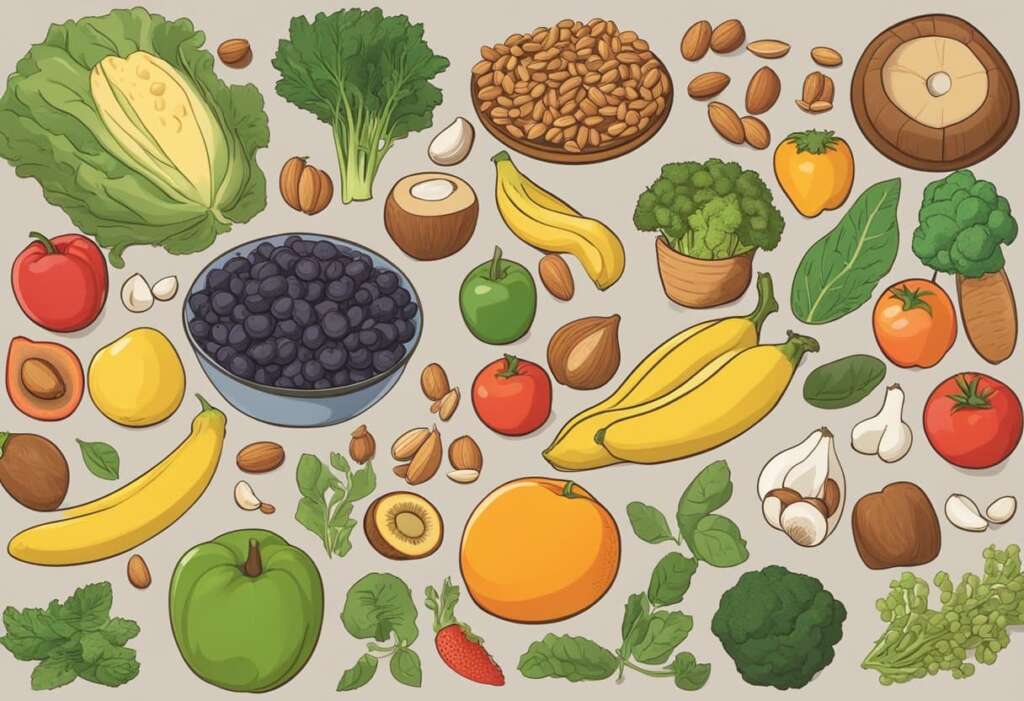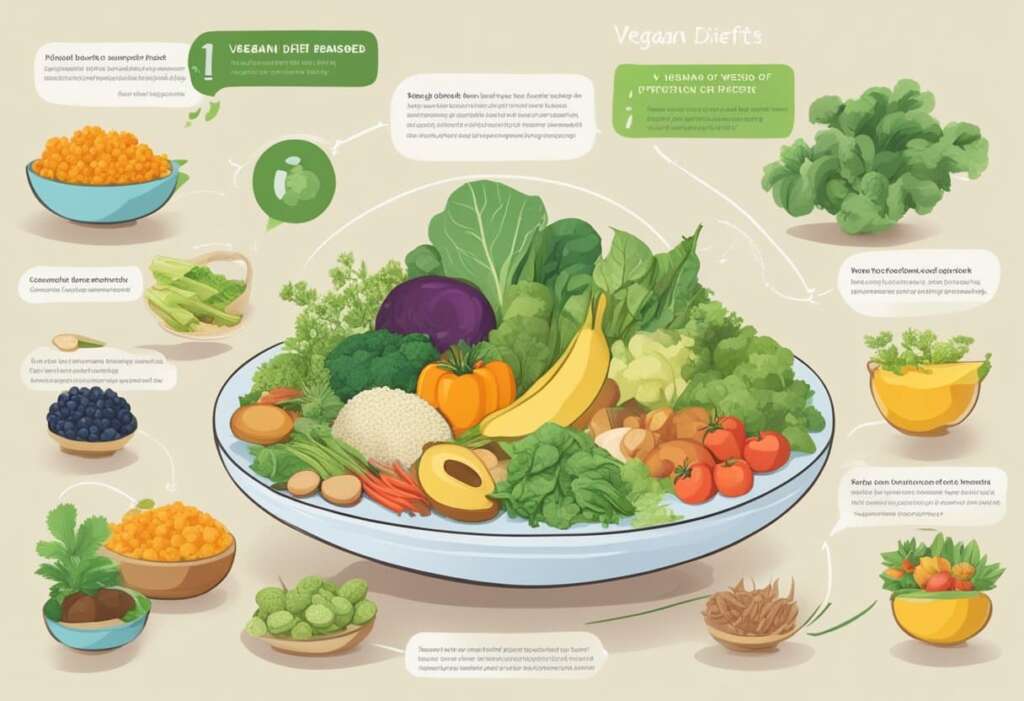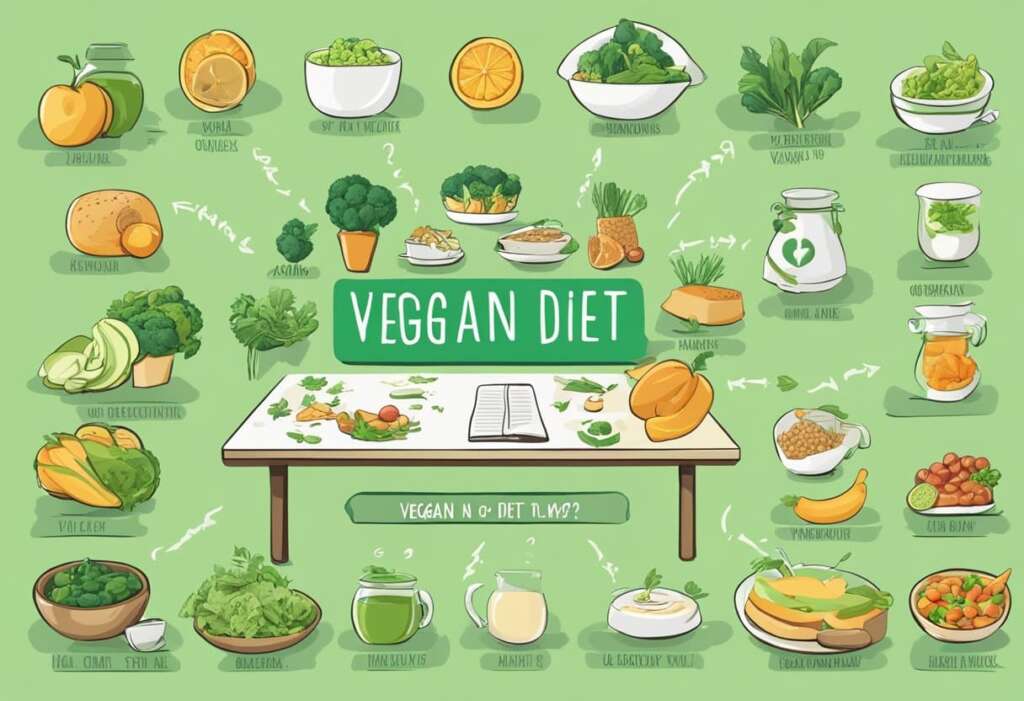The vegan diet has seen a surge in popularity across various demographics, propelled by health concerns, ethical considerations, environmental reasons, and growing dietary trends. By eliminating all animal products, individuals lead a lifestyle that strictly includes plant-based foods, which can have significant effects on health and well-being. The advantages of a vegan diet often center around the reported health benefits and lower environmental footprint of plant-based eating. This aligns with contemporary concerns about personal health and sustainability. Here we list many of the pros and cons of a vegan diet, so you can make an informed decision about your lifestyle choices.

However, as with any diet, there are potential drawbacks to consider. Ensuring a balanced intake of essential nutrients, which are abundantly present in animal products, requires careful planning and knowledge of plant-based sources. The ongoing debate regarding the health impacts of a vegan diet points to its potential limitations and the importance of comprehensive nutritional understanding for those choosing to forgo animal products.
Key Takeaways
- A vegan diet excludes animal products, emphasizing plant-based foods for various health and ethical reasons.
- This dietary approach offers potential health benefits and aligns with sustainable environmental practices.
- Potential nutritional challenges necessitate careful dietary planning to maintain a well-balanced vegan diet.
Understanding Veganism
This section explores the essence of veganism, tracing its roots, defining its dietary framework, and viewing it as a comprehensive lifestyle.
Definition of a Vegan Diet
A vegan diet strictly excludes animal products, encompassing meat, dairy, eggs, and honey. Its emphasis is on plant-based foods such as vegetables, fruits, grains, legumes, nuts, and seeds. The philosophy extends beyond diet, often including a commitment to refrain from animal-derived materials and products tested on animals.
Historical Context
The concept of veganism is not a modern invention. Historical records suggest a presence of plant-based diets throughout history, often linked to ethical considerations, religious beliefs, or lifestyles promoting non-violence. The official coinage of “vegan” dates back to 1944 when the Vegan Society was formed, clarifying veganism as a distinct lifestyle and ethical choice.
Veganism as a Lifestyle
Veganism transcends dietary choices, evolving into a lifestyle that advocates for animal rights and environmental sustainability. Ethical vegans adhere to this diet out of a moral stance against animal exploitation, while others may be motivated by health or environmental concerns. A vegan lifestyle may also influence clothing, cosmetics, and other consumer choices, striving for a reduced personal impact on animal welfare and ecological health.
Nutritional Overview

A vegan diet is characterized by the exclusion of all animal products and is based on plant-derived foods. This emphasizes the importance of understanding how it fulfills nutritional requirements through various sources including proteins, fats, and carbohydrates, as well as necessary vitamins and minerals.
Macro and Micronutrients
Plant-based diets offer a diverse range of macronutrients. Proteins can be obtained from legumes, nuts, seeds, and soy products. However, one should be aware that not all plant proteins contain all essential amino acids, unlike most animal proteins. For fats, the focus should be on consuming unsaturated fats found in avocados, nuts, and seeds, while being mindful of the low intake of saturated fats. Carbohydrates are abundant in fruits, vegetables, whole grains, and legumes, providing a good source of energy and fibre.
Micronutrients, such as vitamins and minerals, are equally crucial. Iron and calcium are present in foods like spinach, kale, fortified plant milks, and tofu, but may be less easily absorbed by the body from plant sources. Vitamin B12 and D are commonly limited in vegan diets and require attention. Omega-3 fatty acids, important for heart and brain health, are found in flaxseeds, chia seeds, and walnuts, but the conversion rate in the body may be inefficient compared to fish oils.
Role of Supplements
Due to potential gaps in a vegan diet, supplements play a significant role. Vitamin B12 supplementation is often necessary as it is naturally found in significant amounts only in animal products. Similarly, vegans may need to supplement vitamin D, especially if they have limited sun exposure. An iron supplement might be advisable for those with diagnosed deficiencies. It’s also critical to consider algae-derived omega-3 supplements to ensure adequate intake of EPA and DHA, the active forms of omega-3 fatty acids.
Special Nutritional Considerations
Individuals with specific health conditions or nutritional needs must carefully plan their vegan diets. For instance, pregnant women, children, and athletes may require higher quantities of certain nutrients like protein, iron, and calcium. Regular blood tests can help monitor levels of crucial nutrients to prevent deficiencies. Those with a higher risk of osteoporosis should pay extra attention to calcium and vitamin D intake and might need to adjust their diets or supplementation accordingly. Moreover, the balance of nutrients is key; for example, consuming vitamin C-rich foods alongside iron-rich plant foods can enhance iron absorption.
Health Benefits
Adopting a vegan diet can offer numerous health benefits, including the potential to prevent, manage, and alleviate symptoms of chronic diseases, assist in weight management, and promote overall physical health.
Preventing and Managing Diseases
A vegan diet has been associated with a lower risk of developing various chronic diseases. Specifically, research indicates that a plant-based diet may reduce the risk of certain types of cancer due to the high intake of fruits and vegetables, which are rich in antioxidants and phytochemicals. For instance, studies have suggested that following a vegan diet can lead to an 8% reduced risk of cancer incidence when compared to omnivorous diets. Furthermore, the adoption of a vegan diet has been linked to a decreased risk of heart disease and type 2 diabetes. This is due in part to lower levels of saturated fats and cholesterol in plant-based foods, which can lead to improved cholesterol profiles and better blood pressure regulation, both of which are crucial in preventing cardiovascular disease.
Weight Management
People who follow a vegan diet often find it easier to manage their weight and obesity rates are typically lower in vegans compared to meat-eaters. A vegan diet, rich in whole grains, nuts, fruits, and vegetables, can naturally lead to a lower calorie intake and higher nutritional content, which supports weight loss and the maintenance of a healthy weight. A review of available studies highlights that a well-planned vegan diet can significantly aid in weight management and improvement in metabolic syndrome.
Enhanced Physical Health
Beyond disease prevention and weight control, a vegan diet can contribute to enhanced physical health in several ways. Plant-based diets are often high in dietary fibre, vitamins, minerals, and phytonutrients—all essential components for good health. These nutritional benefits can lead to improvements in physical well-being, and a person may experience increased energy levels and better digestion. Recent research comparing vegan diets to omnivorous diets has shown potential benefits arising from the adoption of a vegan lifestyle, particularly focusing on comprehensive improvements in physical health markers.
Environmental Impact
The dietary choices individuals make have significant impacts on the environment, particularly concerning the amounts of greenhouse gases produced and the sustainability of food production.
Reduction of Carbon Footprint
A shift towards a plant-based diet can result in a substantial decrease in one’s carbon footprint. Research suggests that diets heavy on animal products lead to higher greenhouse gas emissions compared to those primarily composed of plants. A study highlighted by Nature.com reveals that a vegan diet might have a lower environmental impact compared to an ovo-lacto-vegetarian or omnivorous diet. The production of plant-based foods generally requires less energy from fossil fuels and results in lower overall emissions.
Sustainability of Plant-Based Diets
Sustainability is a hallmark of plant-based diets, which tend to require fewer natural resources such as water, land, and energy. A review in MDPI underlines that plant-based diets are not only beneficial for human health but also promote environmental sustainability. In terms of land use, plant-based agriculture is more efficient, allowing more food to be produced on less land, and often with fewer chemicals and fertilizers, which benefits ecosystems and biodiversity.
Potential Drawbacks
When adopting a vegan diet, careful planning is essential to mitigate issues such as nutrient deficiencies and social impediments. This necessitates awareness of certain nutritional risks and the added complexity that a vegan lifestyle may introduce to dining and social scenarios.
Nutrient Deficiencies
A vegan diet, while rich in certain nutrients, can lead to deficiencies if not properly managed. Key nutrients to monitor include:
- Iron: Plant-based iron is less absorbable, possibly leading to anemia.
- Calcium: Crucial for bone health, often less prevalent in a vegan diet.
- Vitamin D: Typically sourced from sunlight and fortified foods, but less available in purely plant-based options.
- Zinc: Vital for immune function and could be lower without animal products.
- Iodine: Often less in vegan diets, impacting thyroid function.
- Vitamin B12: Not naturally present in plants; deficiency can cause neurological issues.
- Protein: It’s vital to consume enough plant-based protein to meet your daily requirements for building a repairing tissue.
A balanced vegan diet should include fortified foods or supplements to maintain adequate levels of these nutrients.
Challenges of Eating Out
Vegan diners may find options limited at:
- Restaurants: Not all have vegan-friendly menus, and cross-contamination can be a concern.
- Guidance: Lack of knowledgeable staff about vegan options can result in a challenging dining experience.
Vegans should research restaurants in advance or seek venues that specialize in plant-based cuisine to ensure a satisfying meal.
Social and Cultural Hurdles
Veganism may present obstacles in social contexts:
- Social Events: Group gatherings often center around non-vegan food choices.
- Lifestyle: There can be a lack of understanding or support from friends and family unfamiliar with veganism.
These hurdles necessitate open communication and sometimes, bringing one’s food to social events may be the best solution to partake in the festivities without compromise.
Food and Ingredients
In discussing the vegan diet, it’s crucial to identify the range of food and ingredients involved, drawing comparisons to animal-based products and exploring the myriad of vegan alternatives and substitutes available.
Plant-Based Food Sources
The foundation of a vegan diet consists of a diverse selection of plant-based foods, each offering unique nutritional benefits. Fruits and vegetables provide essential vitamins and minerals, while grains especially whole grains offer fibre and additional nutrients. Legumes such as beans and lentils, along with nuts and seeds, are important for their protein content. Soy products like tofu and plant milk serve as staples, often enriched to match the nutrient profile of their animal counterparts. Nutritional yeast is a common flavour enhancer, high in B vitamins.
- Whole Grains: Brown rice, quinoa, barley
- Legumes: Chickpeas, black beans, lentils
- Nuts/Seeds: Almonds, flaxseeds, pumpkin seeds
- Soy Products: Tofu, tempeh, soy milk
Comparison with Animal-Based Products
Animal products such as meat, fish, dairy, and eggs are traditional sources of protein, omega-3 fatty acids, calcium, and vitamin B12. However, many plant-based ingredients can provide these nutrients. Algae and flaxseeds, for instance, are rich in omega-3s, while fortified plant milk and almond butter can contribute to the calcium intake. Legumes and soy products offer robust amounts of plant protein which can rival that of meat and poultry. Nonetheless, vitamin B12, primarily found in animal products, must be supplemented or consumed through fortified foods in a vegan diet.
- Protein: Comparatively, tofu equals chicken breast for protein content.
- Omega-3s: Flaxseeds versus fish
- Calcium: Fortified plant milk versus milk
Vegan Alternatives and Substitutes
A wealth of vegan alternatives exists for nearly every animal-derived food. Vegan cheeses are crafted from nuts and root vegetables, and meat substitutes made from textured vegetable protein or wheat gluten mimic the taste and texture of red meat or poultry. Additionally, aquafaba, the liquid from cooked chickpeas, serves as an egg replacement, especially in baking. Honey can be replaced with agave nectar or maple syrup. These substitutes not only cater to dietary preferences but also allow for versatility in vegan cooking.
- Dairy Alternatives: Soy milk, almond milk, cashew cheese
- Meat Substitutes: Seitan, jackfruit, plant-based burgers
- Egg Replacements: Aquafaba, flax egg, applesauce
Lifestyle Considerations

Adopting a vegan diet extends beyond food choices, affecting various aspects of one’s lifestyle. It involves considered decision-making regarding meal planning, navigating social settings, and understanding broader societal perceptions.
Meal Planning and Preparation
Transitioning to a vegan diet requires thoughtful meal planning and preparation. Individuals must source sufficient plant-based proteins, vitamins, and minerals to meet dietary needs. Options like lentils, chickpeas, and tofu should feature prominently to ensure balanced nutrition. Planning becomes crucial when considering the need for B12 supplementation, often missing from a vegan diet. Meal prepping can help maintain a healthy and diverse vegan diet by minimizing reliance on highly processed foods.
- Essential nutrients to focus on:
- Proteins: legumes, nuts, seeds, tofu
- Vitamins: especially B12, D, and omega-3 fatty acids
- Minerals: iron, calcium, zinc from fortified foods or supplements
Eating Out and Social Events
Veganism can present challenges at restaurants and social events where plant-based options might be limited. In such contexts, it may necessitate prior research to identify suitable establishments or menus. A proactive approach can include calling ahead to restaurants or liaising with event caterers. During social gatherings, vegans might opt to bring a dish to share, ensuring they can partake and possibly introduce others to vegan cuisine.
- Strategies when dining out:
- Choose vegan-friendly restaurants or those with clear vegan options.
- Communicate dietary preferences with hosts or event planners in advance.
Public Perception and Influence
The public perception of veganism has evolved, though misconceptions persist. Vegans may face stereotypes, from being overly fussy to not consuming enough protein – notions often stemming from a lack of awareness about veganism and vegetarianism. Nonetheless, the rise in plant-based eating has resulted in a more knowledgeable public and an increase in vegan options in mainstream venues, reflecting a growing acceptance and influence of the vegan lifestyle.
- Areas impacted by public perception:
- Media representation: influences societal understanding of veganism
- Market offerings: increased vegan products due to demand and awareness
Frequently Asked Questions

What health benefits are associated with adopting a vegan diet?
A vegan diet is often rich in certain nutrients, including fibre, vitamins, and phytochemicals from fruits and vegetables. They may contribute to a lower risk of heart disease and improved weight management.
How might a vegan diet impact long-term health outcomes?
Long-term adherence to a well-planned vegan diet may result in lowered risks of chronic diseases such as heart disease, hypertension, diabetes, and certain cancers.
What are the environmental effects of following a vegan diet?
Following a vegan diet can lead to a smaller ecological footprint, as it generally requires less water and land and produces fewer greenhouse gases compared to diets rich in animal products.
Which nutrients are commonly deficient in a vegan diet and how can they be supplemented?
Nutrients that may be lacking include Vitamin B12, iron, calcium, and omega-3 fatty acids. These can often be supplemented through fortified foods or dietary supplements to prevent deficiencies.
How does a vegan diet compare to an omnivorous diet in terms of overall well-being?
A vegan diet may contribute to a lower body mass index and cholesterol levels. However, the overall well-being of an individual also depends on a variety of lifestyle factors, and dietary needs are highly individual.
Can a vegan diet provide all the necessary nutrients for different stages of life?
If planned correctly, a vegan diet can meet nutritional needs at all stages of life, including pregnancy, lactation, infancy, childhood, and for athletes, with careful attention to specific nutrient requirements.

